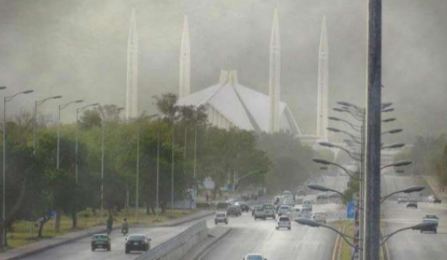ISLAMABAD, OCT 13 /DNA/ – Chairman Capital Development Authority (CDA) and Chief Commissioner Islamabad, Muhammad Ali Randhawa, and Director General of the Pakistan Environmental Protection Agency (Pak-EPA), Nazia Zeb Ali, jointly chaired a meeting at the CDA Headquarters on Monday regarding smog prevention and environmental protection in Islamabad. The meeting was attended by Member Planning and Design Dr. Khalid Hafiz, Member Engineering Syed Nafasat Raza, Member Environment Esfandyar Baloch, Deputy Commissioner Islamabad Irfan Nawaz Memon, DG Resources, Pak-EPA and other concerned officers from CDA. The meeting decided on several measures for smog prevention, the elimination of air pollution and environmental protection in Islamabad.
Chairman CDA Muhammad Ali Randhawa said that in this regard, relevant institutions, in collaboration with the Pakistan Environmental Protection Agency (Pak-EPA), will ensure the implementation of a comprehensive and joint strategy for prevention of smog and clean environment in Islamabad. He said that, in line with the direction of Prime Minister Shahbaz Sharif and Federal Minister for Interior Mohsin Naqvi, protection of environment, including the reduction of smog and air pollution in Islamabad is our top priority.
While being briefed by the DC Islamabad, the meeting was informed that various measures are being taken concerning the transport sector, brick kilns and industries in the city to reduce smog. Vehicle carbon emission tests are being conducted to control air pollution in the transport sector. The briefing informed the meeting that data from vehicle carbon tests related to the transport sector is being shared directly on a dashboard. The Pakistan Environmental Protection Agency (Pak-EPA) informed that five certified laboratories are operational in the capital for testing vehicle carbon emissions. Chairman CDA further directed that more checkpoints be established in Islamabad for testing carbon emissions for emission.
The meeting also discussed controlling air pollution from brick kilns and industries. It was mandated that all brick kilns and industries in the capital city, Islamabad, must transfer into modern and environmentally friendly technology. The meeting specifically set a deadline of 20th October, 2025 for brick kilns to adopt modern zig-zag technology. In this context, it was decided that strict legal action would be taken against brick kilns that fail to transition to zig-zag technology after the deadline of October 20, 2025.
Regarding these measures, Chairman CDA directed that brick kilns which do not adopt modern zig zag technology, continuously violate EPA’s regulations and cause air pollution should be dismantled in accordance with the law. He also directed that the ICT administration should adopt a joint strategy with the Rawalpindi administration against brick kilns located in boundary areas.
The Pakistan Environmental Protection Agency (Pak-EPA) informed the meeting that one station is already operational in Sector H-8 regarding the issuance of authentic Air Quality Index, while a project to install more Air Quality Monitoring Stations across the city is underway.
The meeting also decided on measures concerning other key factors contributing to smog and air pollution, such as the burning of waste in the open air and dust from development projects. Chairman CDA directed that a complete ban on burning waste in the open air be ensured, and cases be registered immediately against those individuals involved under the law. He directed that to control dust from development projects, water sprinkling arrangements must be ensured at all development project sites and the implementation of Standard Operating Procedures (SOP’s) for mitigation measures listed in the Environmental Impact Assessment (EIA) must be guaranteed for all these projects.
Chairman CDA Muhammad Ali Randhwa said that for smog prevention and environmental protection, Pak-EPA, ICT, and CDA must ensure effective coordination harmony and joint action to guarantee the provision of a healthy and clean environment for citizens.

















